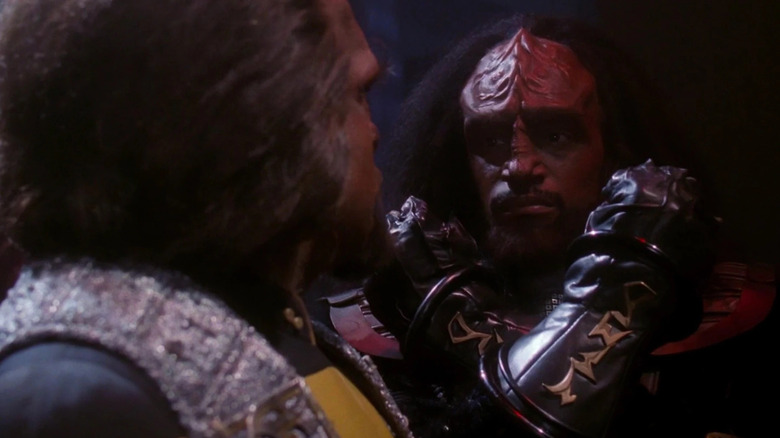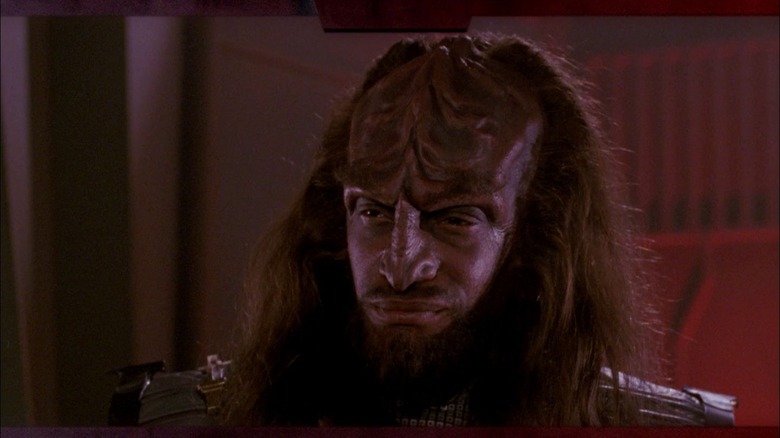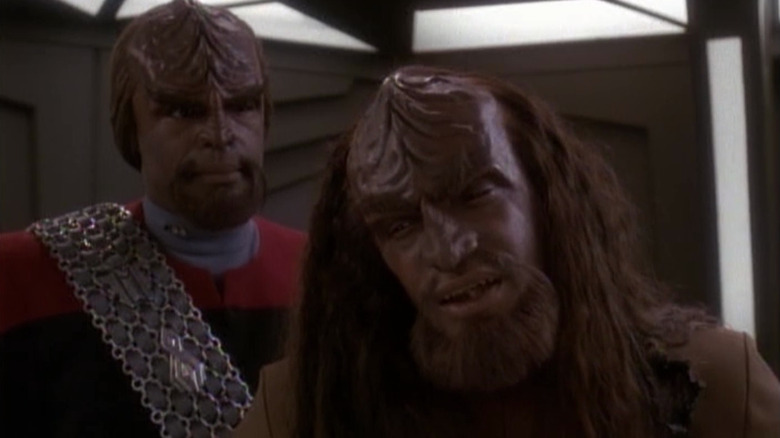Star Trek's Michael Dorn Thinks Kurn Changed Worf's Character For The Worse
The honorable Klingon Kurn (Tony Todd) first appeared in the "Star Trek: The Next Generation" episode "Sins of the Father" (March 19, 1990). In that episode, he revealed that he was the long-lost little brother of Worf (Michael Dorn), the only Klingon in Starfleet. Kurn had been living under a fake name, as his and Worf's father had been (falsely) accused of betraying a camp of Klingons to the Romulans years before. In Klingon society, a son is just as guilty as their parent, hence the episode's title. The crime in question was actually committed by the father of a character named Duras (Patrick Massett), who had covered up the crime and was now poised to sit on the Klingon High Council.
Rather than accuse a potential Klingon ruler of malfeasance and potentially throw the entire Klingon Empire into a civil war, Worf chose to keep all this secret. He instead allowed his family to be dishonored and accepted Discommendation (a grave embarrassment indeed). The family dishonor, of course, would extend to Kurn and Kurn would have to remain in hiding, unable to clear his family name or even admit who he was.
Dorn, it seemed, didn't like that Worf refused to stand up for his family's honor or come to the defense of his brother in "Sins of the Father." The episode presented a great moral quandary for the character, as Worf revealed that he was wise politically, even at the sacrifice of vital parts of his Klingon identity. In the unofficial interview book "Captains' Logs: The Unauthorized Complete Trek Voyages" edited by Mark A. Altman and Edward Gross, the producers and writers said they were proud of the episode, but Dorn revealed he had to make a lot of acting changes to account for Worf's decision.
Poor, poor Kurn
Some might accuse Worf of being dismissive of his brother. He may have been willing to accept dishonor, but he perhaps didn't give full consideration to Kurn, who was already suffering in obscurity, unable to say his family name in public. Worf's Discommendation would only ensure that Kurn remained just as obscure. One of the episode's credited story writers, Ron D. Moore, wasn't so concerned with Kurn's fate, fearing only that the old-fashioned "you secretly have a relative" story would come across as hackneyed:
"I thought Tony Todd did a wonderful job as Worf's brother. [...] I was kind of worried, because there's always that hesitation when you're bringing in other family members no one else has ever seen. Half the audience is ready to throw things at the screen, and you're thinking, 'This better work.' I was there when he stepped on the stage and made it his own. I was in love with 'Sins of the Father' and I fought for it when there was some question about which way we were going to go with it. I really like the fact Worf took it on the chin that episode."
The episode's director, Les Landau, was also thrilled by "Sins of the Father," feeling that the showrunners were allowed to delve into Klingon politics for the first time. Indeed, Landau noted, that set decorator Jim Meese and art director Richard James both won Emmys for the episode. Across the board, most of the showrunners were proud of "Sins of the Father."
Dorn, however, admitted — through his tone — that he was a little miffed at the way the story of "Sins" played out. Up until that episode, he was playing Worf a certain way. After, he begrudgingly had to change.
Dorn of the Planet of the Klingons
Moore may have liked it, Landau may have liked it, Trekkies may have liked it, and it may have won the show awards, but Dorn admitted having to play his character differently formed a mental schism between his view of Worf and the showrunners'. Dorn felt that matters of a Klingon's honor should have been more explicitly explored, perhaps on a personal basis, rather than merely a sociopolitical basis:
"There was a lot more involved in it than the writers realized. Things that have to do with Klingon loyalty and honor. They didn't give it its due. You look at Worf in a different light, and I've played him in a different light since that episode. This is now something they have come up with. I'm doing this on my own. Hey, it's their fault. They wrote it. So now, I'm going to carry on with it."
Following "Sins of the Father," Worf was presented as someone with conflicting loyalties. Does he serve Starfleet, or does he fulfill his duties as a Klingon? After "Sins," of course, these issues would be explored further, notably in a two-part cliffhanger called "Redemption" wherein, yes, Worf and Kurn were redeemed of their crimes and the passionate Duras-hater Gowron (Robert O'Reilly) ascended to the throne. Oh yes, and Worf killed Duras along the way.
Sadly, in the "Star Trek: Deep Space Nine" episode "Sons of Mogh" (February 12, 1996), Kurn would meet a sad fate, also because of Worf's adherence to Starfleet. By then, however, Worf had evolved a lot, and his rejection of his brother was understandable. Not warm or wise, necessarily, but understandable.


